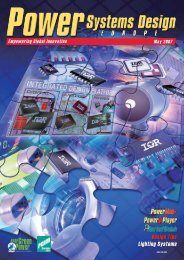Powering Freight & Transportation - Power Systems Design
Powering Freight & Transportation - Power Systems Design
Powering Freight & Transportation - Power Systems Design
Create successful ePaper yourself
Turn your PDF publications into a flip-book with our unique Google optimized e-Paper software.
62<br />
<strong><strong>Power</strong>ing</strong> <strong>Freight</strong> & <strong>Transportation</strong><br />
Figure 2. Maxwell’s BOOSTCAP ® HTM125 module.<br />
trams and metros, all of which benefit<br />
from the adoption of a hybrid power<br />
train approach. Consequently, primary<br />
energy demand and maintenance costs<br />
can be considerably reduced.<br />
The obvious energy storage device<br />
might be a rechargeable battery. However,<br />
such technology shows evidence<br />
of some serious limitations in freight and<br />
transportation applications. Batteries<br />
are heavy in weight, large in size, slow in<br />
charging rate and high in maintenance<br />
costs due to reduced cyclic capabilities.<br />
Furthermore, battery technology suffers<br />
from degraded performance at low temperatures.<br />
Today, heavy transportation application<br />
engineers are considering alternative<br />
energy storage technology - the ultracapacitor.<br />
Ultracapacitors, or doublelayer<br />
capacitors, provide high charge<br />
acceptance, high-efficiency, high cycling<br />
stability, and excellent low-temperature<br />
performance.<br />
Ultracapacitors are therefore the<br />
perfect component to store the heavy<br />
transportation vehicle’s kinetic energy<br />
during frequent braking events. In comparison<br />
to battery chemical reaction,<br />
energy storage in ultracapacitors is<br />
based on an electrostatic reaction with<br />
an extremely short time constant. For<br />
an ultracapacitor, the energy storage<br />
begins as soon as electrons are available.<br />
During the acceleration phase of<br />
the vehicle, the previously stored energy<br />
can be re-injected into the application<br />
thereby avoiding important absorp-<br />
tion in network primary energy. Due to<br />
the extremely low internal resistance of<br />
ultracapacitors, the losses are reduced<br />
to a minimum and the energy transfer<br />
efficiency is maximized. Furthermore,<br />
ultracapacitors can be cycled more<br />
than 1 million times without experiencing<br />
substantial performance degradation.<br />
Additionally, ultracapacitors are<br />
environmentally friendly because they<br />
do not contain heavy metals and can<br />
therefore be recycled easily. Finally, and<br />
perhaps most importantly, ultracapacitors<br />
offer more than 10 times the power<br />
of batteries, which, when translated into<br />
functional application characteristics,<br />
Figure 3. Bombardier’s Mitrac Energy Saver trains use Ultracapacitor technology<br />
for energy storage.<br />
<strong>Power</strong> <strong>Systems</strong> <strong>Design</strong> October 2008<br />
www.powersystemsdesign.com<br />
<strong><strong>Power</strong>ing</strong> <strong>Freight</strong> & <strong>Transportation</strong><br />
Figure 4. Still’s Hybrid forklift equipped with Maxwell’s Ultracapacitors modules.<br />
provides higher performance in terms<br />
of acceleration of a vehicle, an essential<br />
goal of such applications.<br />
Ultracapacitors for Heavy <strong>Transportation</strong><br />
Applications<br />
Heavy transportation vehicles, such as<br />
trains trams and metros, place particular<br />
demands on energy storage devices.<br />
Such devices must be very robust and<br />
reliable displaying both long operational<br />
lifetimes and low maintenance requirements.<br />
Further, the devices must operate<br />
efficiently under harsh conditions<br />
including handling high peak currents,<br />
high duty cycle and frequent deep discharging.<br />
Maxwell Technologies, has<br />
addressed these issues with its BOOST-<br />
CAP ® HTM125 module for ultracapacitor-based<br />
braking energy recuperation<br />
and torque assist systems in transportation<br />
applications. Operating at 125V, the<br />
new module can store more energy per<br />
unit volume, deliver more power per unit<br />
volume and weight and perform longer<br />
than any other commercially available<br />
ultracapacitor solution.<br />
The HTM125 module is based on<br />
Maxwell’s MC power cell, rated at 3000<br />
Farads, which individually has a very low<br />
internal resistance, resulting in excellent<br />
efficiency during charging and discharging.<br />
Up to 12 modules may be linked in<br />
series to deliver as much as 1500V per<br />
system. One key factor in the energy<br />
storage systems is the thermal management.<br />
Using Maxwell's ultracapacitor<br />
modules, which incorporate efficient<br />
cooling systems, allows higher continuous<br />
currents up to 150A, and 750A as<br />
a peak (750A during 1 second @ 10%<br />
duty cycle), without compromising the<br />
reliability.<br />
Ultracapacitor products have been<br />
fully tested and qualified in light rail<br />
applications over many years. As an<br />
example, Bombardier's LRV (Light Rail<br />
Vehicle) prototype has been in passenger<br />
operation since 2003 in Germany<br />
and has recorded energy savings up to<br />
30% at around 300,000 load cycles per<br />
year. This success has now resulted in<br />
Bombardier delivering Mitrac Energy<br />
Saver trains utilizing ultracapacitor technology<br />
for energy storage for operation<br />
in the city of Heidelberg.<br />
Ultracapacitors for Heavy-Duty<br />
Equipment<br />
In the lifting, hoisting, and excavating<br />
equipment markets, typical characteristics<br />
of the energy storage demands<br />
include deep discharge cycling coupled<br />
with high duty cycle requirements.<br />
Cost is also a significant factor<br />
in the implementation of<br />
an energy storage option. In<br />
heavy duty equipments, the<br />
cost of the unit is outweighed<br />
by the durability, reliability and<br />
productivity factors. The initial<br />
cost of equipment is extremely<br />
high and this means that an<br />
elevated initial investment cost<br />
is returned faster for a higher<br />
performance, reliable and durable<br />
system.<br />
Maxwell’s heavy duty<br />
equipment solutions are the<br />
most flexible energy storage<br />
solution to power cranes,<br />
straddle-carriers, RTG, stackers,<br />
forklift, utility trucks, and<br />
other earth moving and mining<br />
equipments. With the help of<br />
the company’s ultracapacitor<br />
products, harbor crane<br />
manufacturers are providing<br />
innovative solutions to port<br />
authorities delivering savings<br />
of up to 30% on diesel consumption<br />
realized through both braking energy<br />
recovery and downsizing of diesel<br />
engines. The substantial reduction in<br />
terms of CO 2 emissions is also a significant<br />
advantage for the harbor's authorities<br />
in today’s climate where global<br />
warming and levels of gas emissions<br />
are becoming an increasingly greater<br />
concern.<br />
In lifting applications, studies have<br />
shown that new generations of forklifts<br />
equipped with Maxwell's ultracapacitor<br />
products can increase the autonomy<br />
and life of the equipment’s battery system<br />
by more than 25%, thereby reducing<br />
the cost of downtime and maintenance.<br />
The time for efficient and environmentally<br />
friendly energy storage and management<br />
has come and Maxwell’s<br />
ultracapacitor solutions have proven<br />
themselves to fulfil this requirement.<br />
These solutions are an essential part<br />
in today’s innovative, efficient hybrid<br />
system for public transportation and<br />
heavy industrial applications allowing an<br />
increase in power efficiency and a reduction<br />
in fuel consumption and global<br />
CO2 emissions.<br />
www.maxwell.com<br />
63









